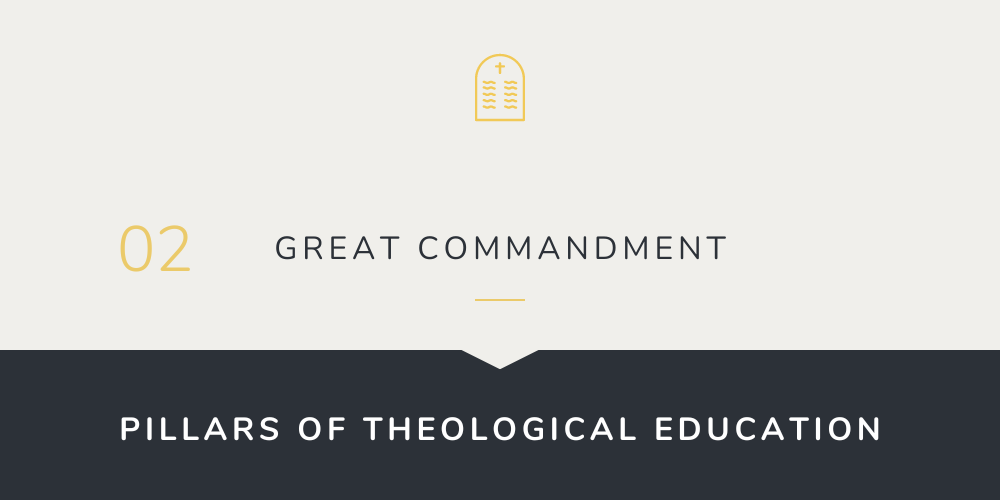BibleMesh is guided by three pillars: the Great Commission, the Great Commandment, and the Great Tradition. This blog series will discuss the role that each pillar plays in theological education.
When the Pharisees heard that he had silenced the Sadducees, they came together. And one of them, an expert in the law, asked a question to test him: “Teacher, which command in the law is the greatest?” He said to him, “Love the Lord your God with all your heart, with all your soul, and with all your mind. This is the greatest and most important command. The second is like it: Love your neighbor as yourself. All the Law and the Prophets depend on these two commands.” Matthew 22:34-40
The second pillar of BibleMesh is the Great Commandment. At times we may be prone to think that this Great Commandment is something we do after theological education. Rather, the Great Commandment orients, frames and centers all that we do, including our theological education. Let’s look at three ways the Great Commandment shapes our approach to those studies.
First – A Great Commandment theological education will rightly order and fuel the connection of the heart, soul and mind for the love of God.
Often, we can focus on the divisions of “heart, soul, and mind” mentioned in Matthew, concentrating on what it means to love God with these separate pieces. Many Christians are tempted to think that the life of the mind is in competition with the life of faith. It is important as we pursue our theological education to pursue it in a way that rejects that idea. When Christ talks about loving God with our heart, soul and mind, He is not driving wedges between them. Rather they are different angles of a life that loves God holistically.
A Great Commandment theological education rightly orders and fuels the connection of the heart, soul and mind for the love of God. Remember, as you do the careful work of the mind, that your mind is meant to be connected to your heart and your soul. Your studies should be completed with diligence, but also on your knees with prayer and connected to your love of God. Loving God in your theological education means that we should never focus on our mind and studies in a way that divorces it from our heart and soul.
Second – A Great Commandment theological education spurs love not as mere affection but as a motivated desire in directing the person we love to proper fulfillment and flourishing only found in the love of God.
What does it mean to love your neighbor in theological education? A Great Commandment theological education spurs love not as mere affection but as a motivated desire in directing the object of love (the self, the neighbor) to proper fulfillment in the love of God. In many places around the world, love has become sentimentalism, but that is not what Christ means here. Any time we talk about love, we must be on guard to recognize that love isn’t just affection but is invested in directing others to God. Loving the neighbor in theological education recognizes that we receive love from God and we point others to God’s love poured out for them on the cross. Our theological education should not be just writing papers or preaching sermons that impress people, but rather desiring that people see God’s love in us so they might turn to God.
Third – A Great Commandment theological education rejects mere head knowledge and instead pursues knowledge of God and His word, oriented around the love of God and neighbor.
In this passage, verse 40 is often overlooked in the discussion about the Great Commandment.. When asked what commandment is greatest, Jesus says “all the law and the prophets depend on this.” Jesus is showing that it is the entire OT, the entire word of God, that depends on these two commands. He is helping us see that the Great Commandment animates and gives life to all that God commands. A Great Commandment theological education rejects mere curiosity and instead pursues knowledge of God and His word, oriented around the love of God and the love of neighbor. Everything that the Bible teaches hangs on these two loves. It doesn’t mean that they are the only two things that matter, but that as we seek to understand all that God has revealed, we should expect it to be consistent with the Great Commandment. Everything hangs on these commands to love God and love neighbor.
Let us pursue the Great Commandment even as we pursue our studies. Let our love of our triune God and love for our neighbor make sense of all we do in our studying, writing, and speaking. Ultimately, we want to share our hope in God, whose love for the world calls people to Christ and recognizes that only in Him will they find fulfillment.
BibleMesh is guided by three pillars: the Great Commission, the Great Commandment, and the Great Tradition. This blog series will discuss the role that each pillar plays in theological education.
